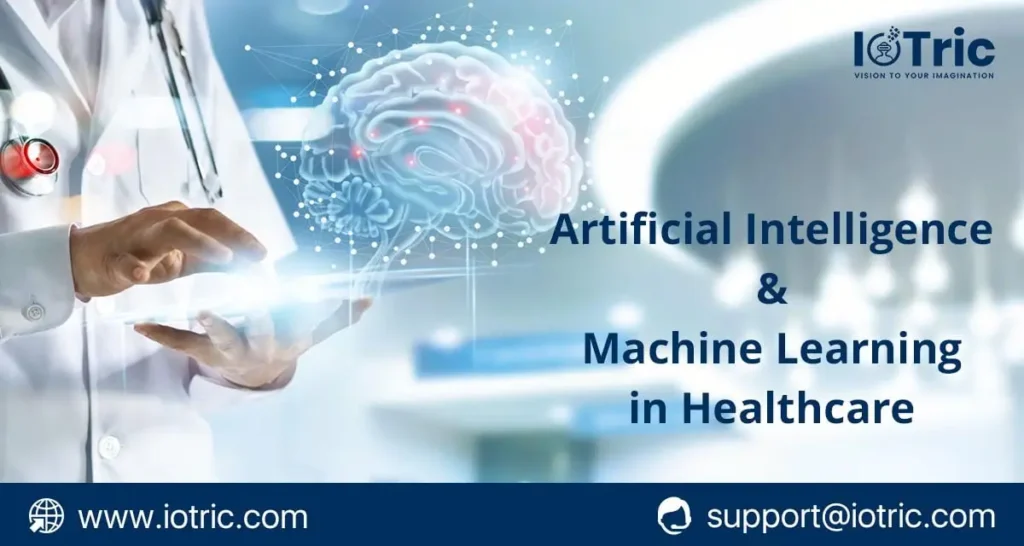Artificial Intelligence
AI & ML in Healthcare

How AI & ML can help Healthcare industry?
Introduction
In the era of increasing complexity and size of health data, Artificial intelligence and Machine Learning can provide an ease to deliver data-driven decisions in the healthcare sector. Such decisions ensure diagnosis better than humans, large-scale automation across the supply chain, and more accurate predictions. The use of Artificial Intelligence and Machine Learning technologies is highly prevalent to transform diverse aspects of patient care as well as administrative processes within the industry.

What are AI and ML?
AI is the engineering of making intelligent machines that behave like human beings. Such intelligence is beyond human capabilities to make better and efficient decisions. AI programmed machines imitate humans to make decisions, predictions, and analytical reasoning. Moreover, AI is referring to the application of computation algorithms to classify, predict, and analyze large datasets for making useful insights.
Meanwhile, ML lies under the umbrella of AI. It is a statistical technique for fitting models to data analytics. It can help to train machines to make data-driven decisions and predictions. Moreover, the use of ML in healthcare settings include assessment of quality of input data, and decisions that serve as foundations of ML models. In the interval, the quality of decisions made by ML trained machines is based on the quality of data collected from EMRs. It also ensures that the end product is transparent, interpretable, and ethical.
AI and ML applications in healthcare
The prevalent use of Artificial Intelligence and Machine Learning technologies can assist healthcare providers in patient care, administrative processes, and addressing existing healthcare challenges. They are becoming cornerstones of healthcare domains, and capitalizing robust EMR data, and contributing a wide range of applications.
Some imperative applications of AI and ML and healthcare domains are discussed below:
Automated image analysis
AI and ML can help to train a machine to review and scan clinical images without any human intervention. It would enable cardiologists, radiologists, and other physicians to identify essential insights and avoid potential errors. Moreover, it is potent to establish more precise decisions. It can also assist the physicians in a friendly, customized, and accurate manner throughout the diagnostic decision process.
Real-time health monitoring with IoT
During COVID-19 pandemic, an aggressive increment in patients’ admission was seen in worldwide hospitals. Manually, it was highly difficult for the health professionals or doctors to monitor the rapid rate of patient health. However, IoT based health monitoring systems are the solutions to detect patient health in an automated manner. In contrast, AI and ML deliver such solutions using data values such as body temperature, pulse rate, and oxygen saturation of the patients to diagnose patient health. The data values are obtained from wearable devices (IoT devices) for real-time health monitoring.
Prediction for for Knee Arthroplasty
AI and ML can assess the viability of knee arthroplasty. It can also determine if the patients with knee pain need any further knee arthroplasty or not. While, knee arthroplasty may include total knee replacement, unicompartmental (partial) knee replacement, and kneecap replacement (patellofemoral arthroplasty).
Infection surveillance
AI algorithms can detect Healthcare-associated infections (HAIs) in the hospitals. The use of AI is a feasible method for HAI surveillance to save time, improve infection prevention performance, and promote accurate surveillance.
Consolidate drugs discovery
AI algorithms led to the foundation of a drug discovery platform to help the medical companies to repurpose existing drugs, and bio compounds. It is possible with consolidation of data science, chemistry, and biology.
Conclusion
In conclusion, AI and ML healthcare applications are oriented to health data. The collection and usage of such data is prone to many of the ethical concerns such as uninformed data collection, excessive exposure, data breach, algorithm transparency, lack of regulations, governance of AI etc. Thus, it is important for the researchers to focus on corroborated evidence to build trust of the people in health-related AI applications.